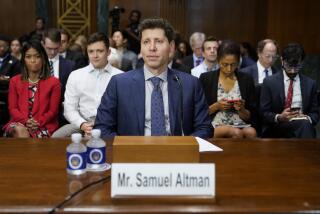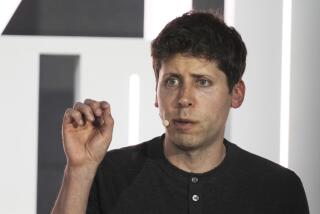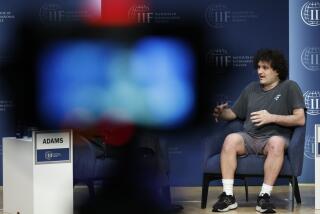Pressure grows on Wolfowitz
WASHINGTON — A special committee of the World Bank’s governing board increased pressure on President Paul D. Wolfowitz to resign Monday, concluding that he went too far in arranging a job and pay raises for his companion.
The seven-member committee did not make its report public, but a bank official with ties to the panel said that Wolfowitz was given only a day or two to respond. The maneuver seemed designed to force him to step down quickly, thus avoiding further public action in the bruising controversy.
The report was characterized as an exhaustive, 300-page indictment of Wolfowitz’s management of the international community’s premier anti-poverty institution, according to sources familiar with the document. The sources declined to be identified because they were not authorized to speak for the committee or the bank.
In a further sign of Wolfowitz’s deteriorating position, one of his top aides, Kevin Kellems, resigned Monday. He had served as a senior advisor and director of external relations strategy during Wolfowitz’s time at the bank.
“Given the current environment surrounding the leadership of the World Bank Group, it is very difficult to be effective in helping to advance the mission of the institution,” Kellems said, adding that he was leaving to pursue other opportunities.
“I have tremendous respect and admiration for the bank staff and management and treasure the many friendships,” he said.
Kellems had worked at the Pentagon when Wolfowitz was deputy defense secretary.
He and another top Wolfowitz aide, Robin Cleveland, had become a focus of criticism inside the bank, where staffers considered them more loyal to Bush administration policy than dedicated to the international mission of the World Bank.
Wolfowitz, who is two years into a five-year term as president, has vowed not to quit -- saying he acted in accordance with bank ethics rules and did nothing wrong in making the job arrangements for his companion, Shaha Ali Riza, who was already an official at the World Bank when he became president.
When he took office, Wolfowitz brought the possible conflict of interest to the board’s attention, and it was agreed Riza should leave the bank. Exactly how the arrangements were made for her transfer to the State Department and her salary increases is in dispute.
But the conflict issue is only the most concrete manifestation of a larger controversy over what Wolfowitz’s critics see as his high-handed management style and a naive, sometimes partisan campaign to stamp out corruption in countries receiving World Bank assistance.
Many of the bank’s worldwide staff of 13,000 have been openly critical of Wolfowitz, complaining bitterly that he cut himself off from the bank’s career experts and made decisions unilaterally. Among the decisions they objected to was the opening of an office in Iraq -- where many bank officials regard security as too chancy for the institution to operate effectively.
Wolfowitz’s most ardent critics outside the bank are European governments that remember him as a principal architect of the Iraq war under President Bush. They also see his approach to corruption by governments that receive World Bank funds as misguided.
Though most bank officials say they support a crackdown on corruption, many contend that Wolfowitz enforces it selectively, cracking down on countries whose foreign policy is at odds with the Bush administration and taking a more lenient approach to administration allies.
Since the United States, as the biggest financial contributor to the bank, traditionally chooses the president, European leaders’ general unhappiness with Bush has played a part in the controversy.
Bank sources, who asked not to be identified while the situation was unfolding, said the countries firmly in Wolfowitz’s camp had dwindled to three: the United States, Canada and Japan. None of those nations is represented on the board’s investigative committee, although all three have representatives on the full 24-member board.
But public support for Wolfowitz in Japan and Canada seems to be waning. Asahi Shimbun, Japan’s largest newspaper, has urged the bank president to resign, and the conservative Canadian government of Stephen Harper is coming under fire at home for supporting Wolfowitz.
Though a host of larger issues lay behind the controversy, it was the ethics issue over Riza that put the bank president’s job on the line.
When Bush named Wolfowitz to head the bank in 2005, Riza was working there as a “gender specialist” at a salary of $132,600. The bank’s ethics committee advised that Riza be relocated to a job beyond the bank president’s supervisory reach, but Wolfowitz insisted on maintaining a “professional relationship” with her.
It was eventually agreed that Riza would assume duties in the State Department, setting up the Foundation for the Future to promote democracy. She was given a pay raise to compensate for the fact that she would have to drop out of competition for promotion at the bank.
The ethics committee -- whose chairman said Wolfowitz helped Riza negotiate a pay raise to $180,000 -- said it never intended for the bank president to immerse himself in the particulars of Riza’s salary.
Wolfowitz maintained that the ethics committee encouraged him to do so. Riza has since received another raise, to $193,590.
Carl Tobias, a constitutional law professor at the University of Richmond in Virginia, said Monday that Kellems’ resignation was another sign that the Riza situation would drive Wolfowitz from the bank.
“Isn’t that the pattern in Washington: that the subordinates go first,” he said, “clearing the way for the principal? I suppose he could survive, but I can’t see how.”
The chairman of the World Bank investigative committee, Herman Wijffels of Holland, declined to comment.
“I’m afraid I cannot give you any reaction. Not to people from the inside or the outside, I cannot talk about this. I have strict ethics on this point as long as I am in the center of this procedure,” he said.
The board hopes to force Wolfowitz to resign so that it doesn’t have to take formal action against him. But for the moment, Wolfowitz was sticking to his plan to visit Slovenia next week for a conference on how to make development assistance more effective.
“It would certainly be out of character for him to quit now,” said another person close to the struggles between Wolfowitz and the bank’s staff.
joel.havemann@latimes.com
More to Read
Sign up for Essential California
The most important California stories and recommendations in your inbox every morning.
You may occasionally receive promotional content from the Los Angeles Times.










